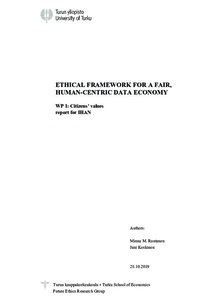Ethical framework for a fair, human-centric data economy - WP 1: Citizens’ values
Minna M. Rantanen; Jani Koskinen
https://urn.fi/URN:NBN:fi-fe2021042824033
Tiivistelmä
European Union (EU) has been the forerunner and visionary of data protection and pri-vacy. However, the data economy is global business where the values of EU drives are not yet fulfilled or understood. Sitra’s IHAN project is aiming to make a difference by creating the foundation for a fair data economy by treating the individuals as key stakeholders.
The goal of this report is to seek the values of citizens considering the fair data economy. The research is based on the previous value research by Schwartz and Hofstede. This is complemented with a survey on citizens (n=8004) – focusing on fair data use – that was conducted for Sitra by Kantar TNS Ltd in the four member states of EU: Finland (n=2000), France (n=2000), Germany (n=2004) and the Netherlands (n=2000). The answers of two open questions, that were part of the survey, were used as empirical material for our analysis. Thematic analysis was used to find values that should be considered when developing fair human-centric data economy.
The main finding – based on previous value research of Hofstede – is that the values differ in different European countries and it seems that we do not share the similar “European values”. Instead, people in EU have diverse values based on their cultural back-ground. However, this is not the simply answer. Even though we do not have similar values basis, we do share same common values and people are able to create new ones, which should be the goal of when creating a people-centric data economy. If we cannot find commonly acceptable values, the data economy continues to be field filled with doubts, exploitations and scandals, where mere economical needs are at the centre of ecosystem.
In thematic analyse we found eighth different themes: User's control over data and data sharing, Transparency and being informed, Security, Trust and fairness, Compensation or benefits for users, Supervision and rules, Attitudes towards data collection and data economy and Unable to answer/does not know. The founded values were also located to Schwartz’s model and main finding was that Transparency seems to be connecting value for other values. It is understandable as transparency is only way to ensure the fulfilment of other values. Without transparency one may not see how convincing security or trust could be achieved.
These themes show the issues that should be taken account when developing fair data economy that meets the justified values of people. Therefore, it seems that key factors for achieving fair human centric data economy –that is in line with values of humans– are transparency and open communication with people all the time. We need open and rational discourse were people are truly seen as equal stakeholders and their interests are no bypassed by other stakeholders.
Kokoelmat
- Rinnakkaistallenteet [27094]
